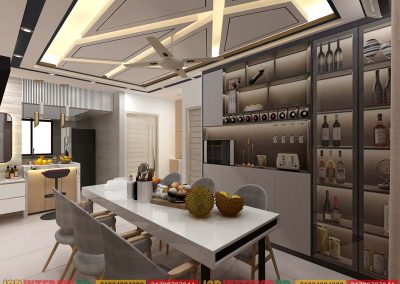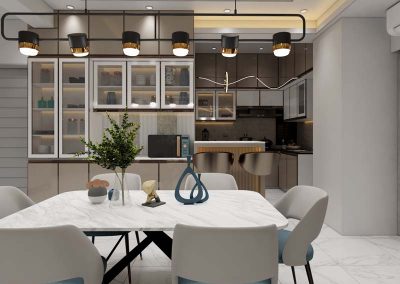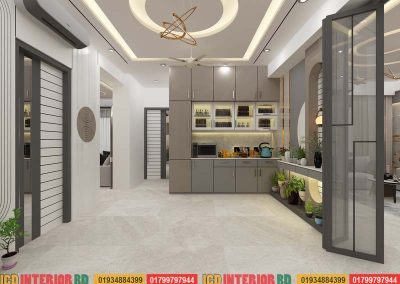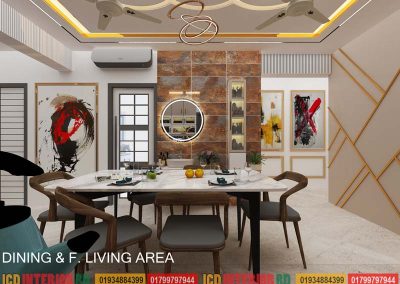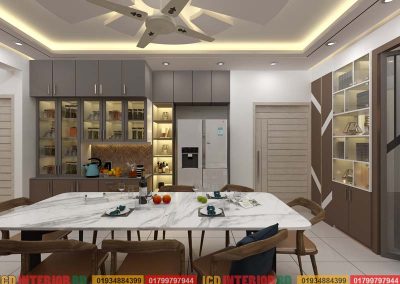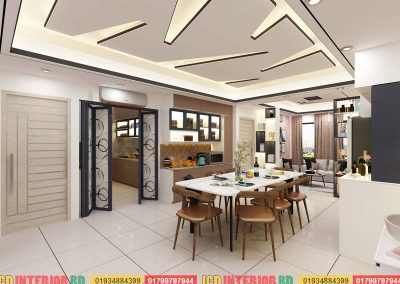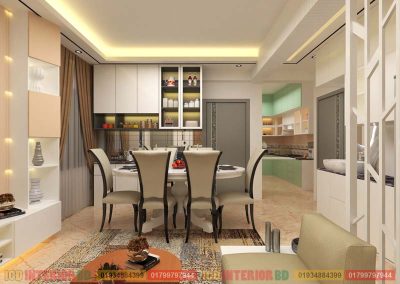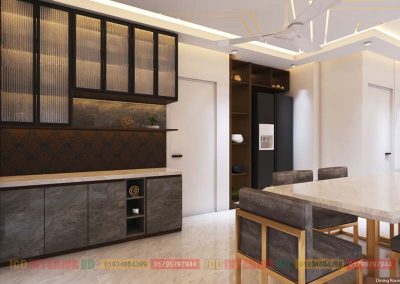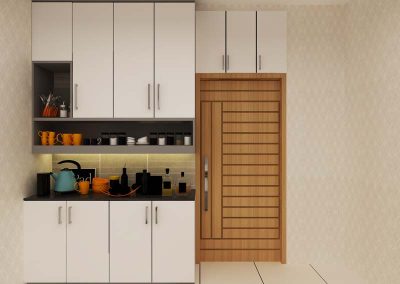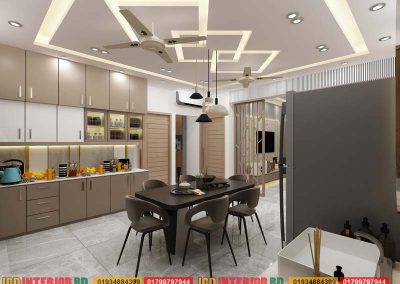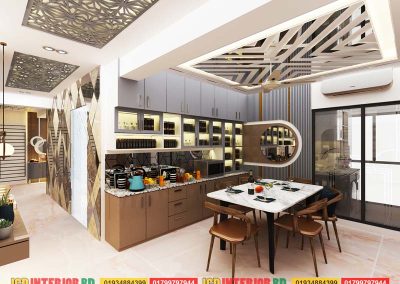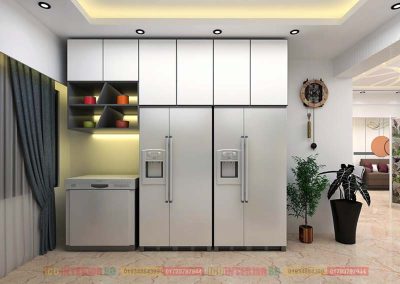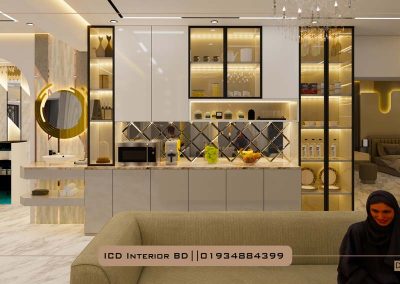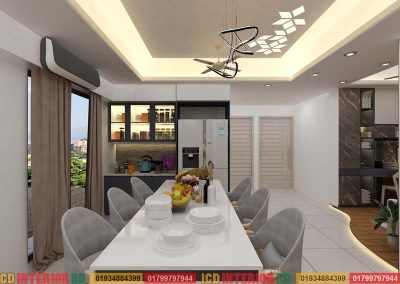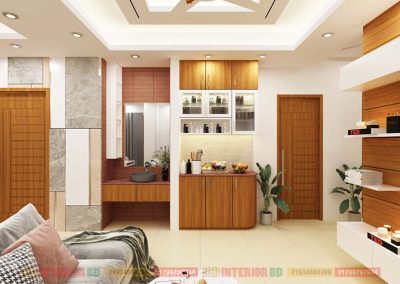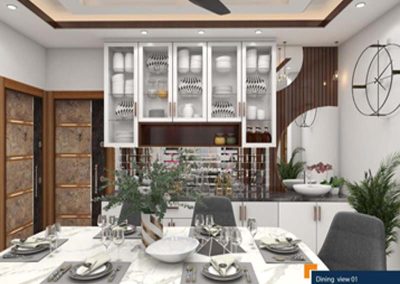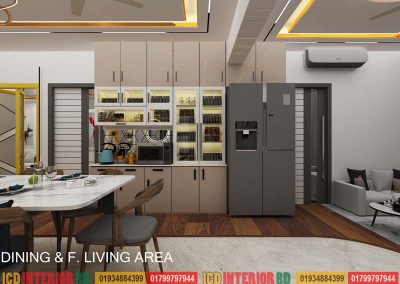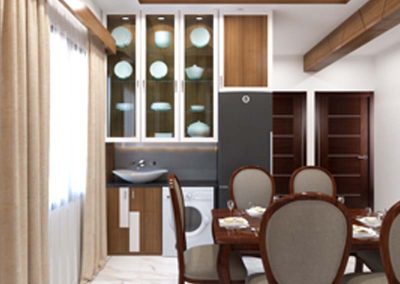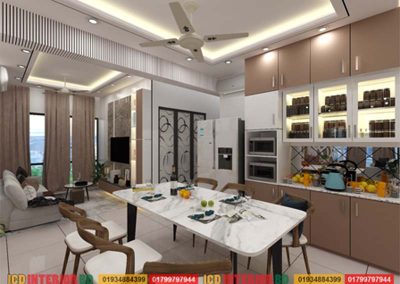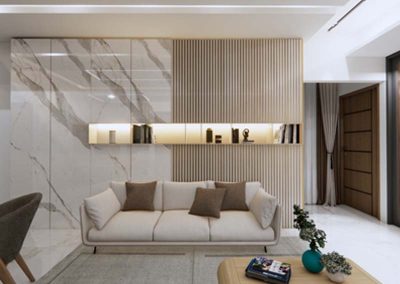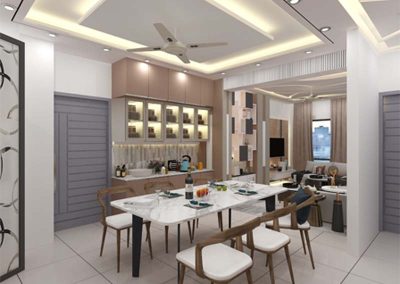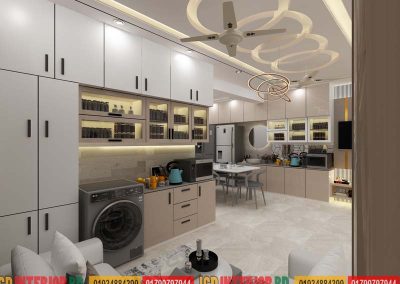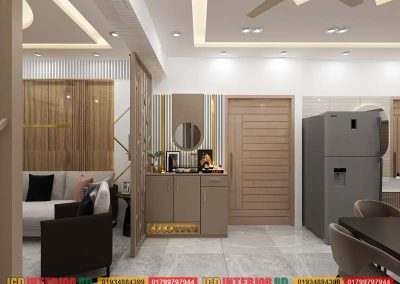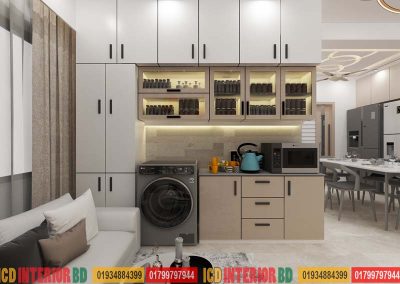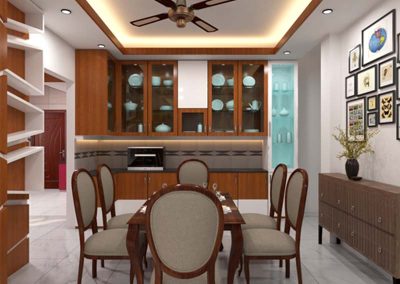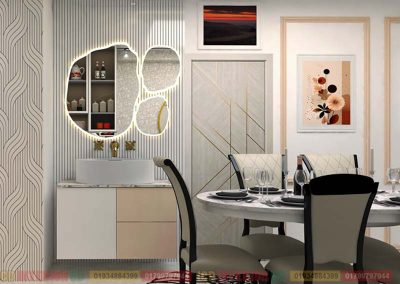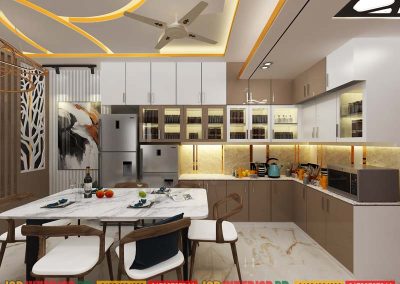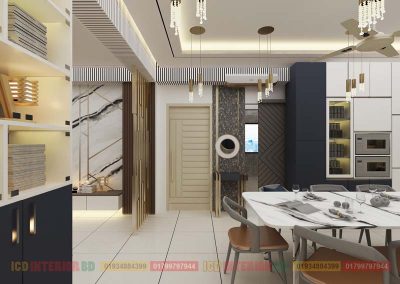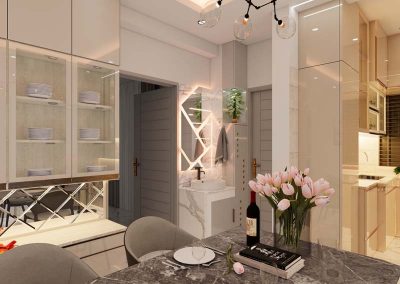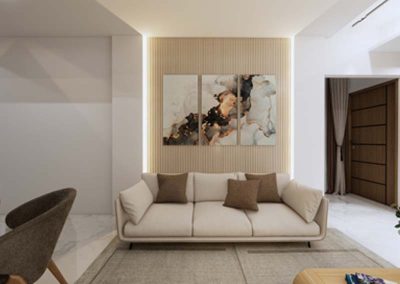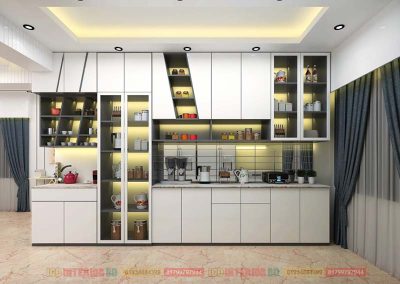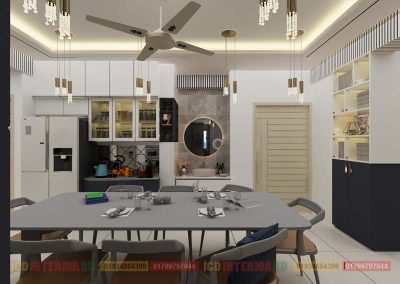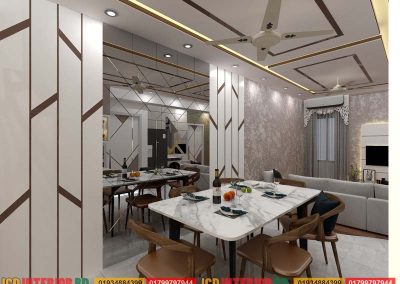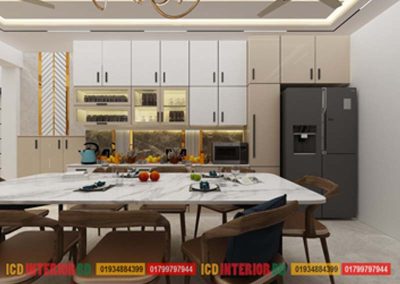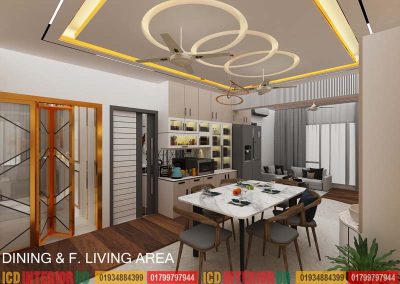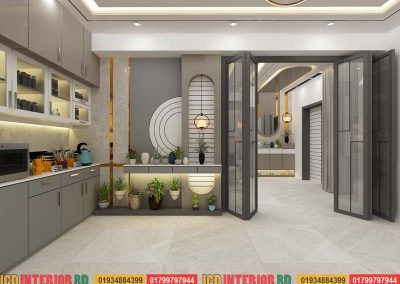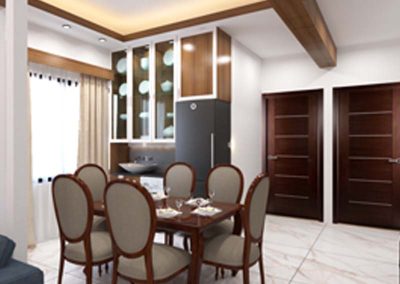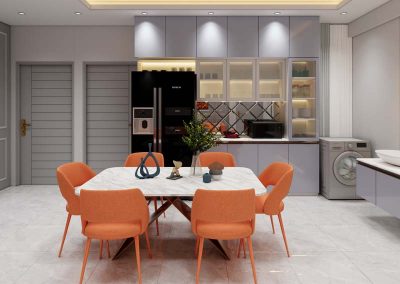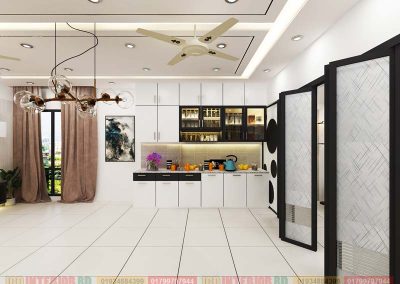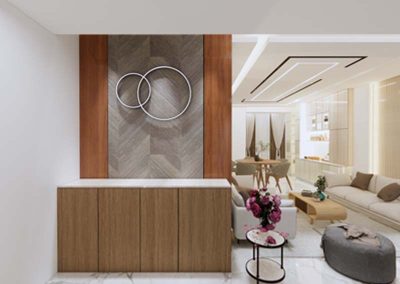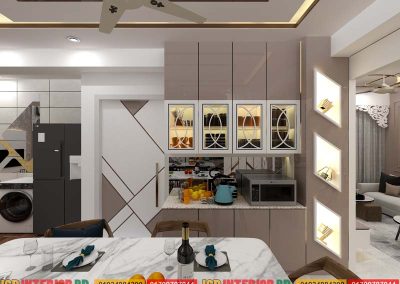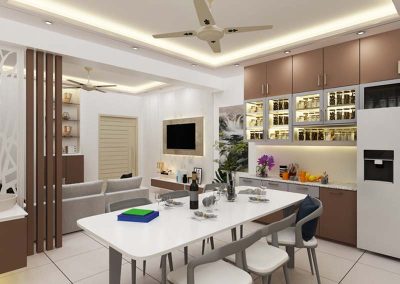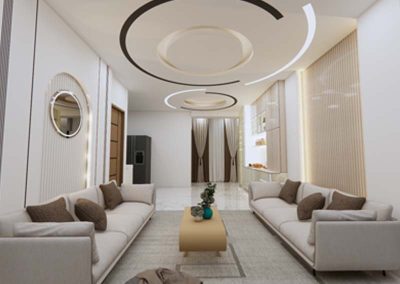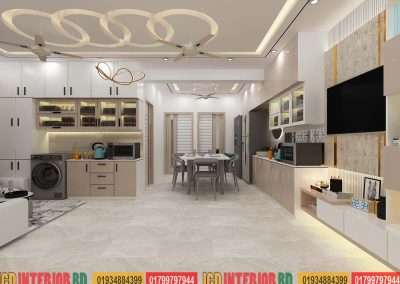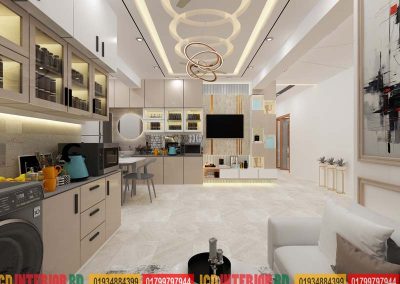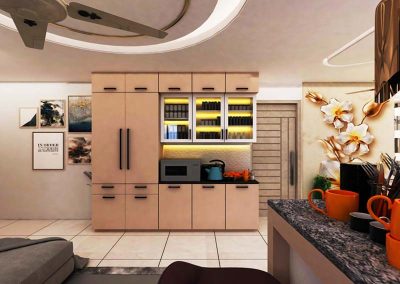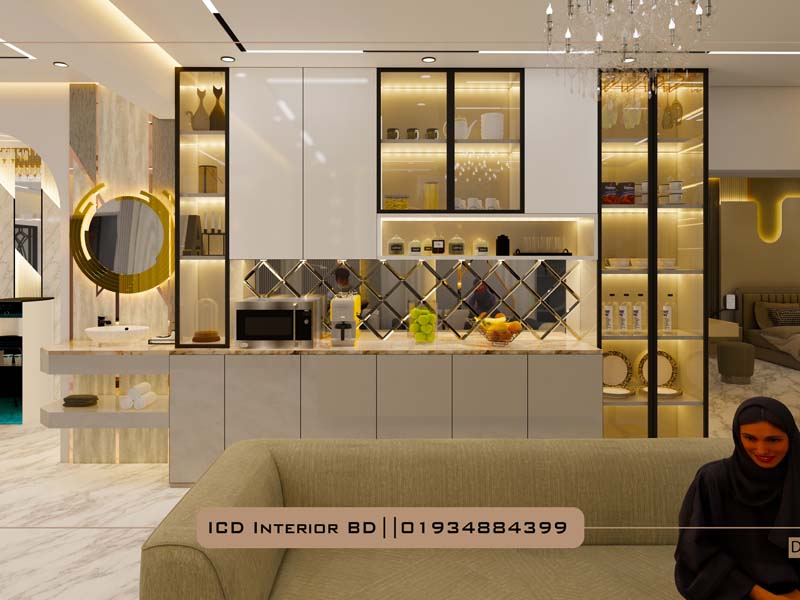Dining Room Design
Dining Room Interior Design in Bangladesh
What is the Dining Room Design?
Dining room design refers to the thoughtful planning, layout, and decoration of a space specifically intended for eating meals. It balances functionality with aesthetics, creating a comfortable and inviting environment for family gatherings, formal dinners, or casual meals. A well-designed dining room enhances the overall experience of dining and encourages social interaction. At the heart of dining room design is the dining table, which acts as the focal point. The shape, size, and material of the table should match the room’s dimensions and the household’s lifestyle. Chairs should be comfortable, complement the table, and allow for easy movement. The placement of the dining set is also crucial, often centered under a chandelier or lighting fixture to define the space.
Lighting plays a key role in dining room design. A mix of ambient, task, and accent lighting—such as pendant lights, chandeliers, or wall sconces—can create a warm and welcoming mood. Proper lighting highlights the table setting and enhances the visual appeal of the room. Color schemes, wall décor, flooring, and storage (like buffets or sideboards) also contribute to the room’s style, whether it’s traditional, modern, minimalist, rustic, or eclectic. Accessories such as curtains, rugs, mirrors, and artwork add personality and cohesion.
Good dining room design also considers flow and connectivity with adjacent rooms like the kitchen or living room, especially in open-concept homes. It must ensure there’s enough space for movement and serving. Ultimately, dining room design is about creating a functional, stylish, and harmonious environment where people can come together to enjoy meals, celebrate special occasions, and build memories. Whether the space is large or small, luxurious or simple, good design makes it both beautiful and practical.
The Role of a Professional Architect for Dining Room Interiors
A professional architect plays a crucial role in the design and transformation of dining room interiors. Their expertise goes beyond aesthetics; they ensure that the space is both functional and harmoniously integrated with the overall structure of the home. An architect brings technical knowledge, creative vision, and an understanding of spatial planning to create a well-balanced and efficient dining room design. One of the primary roles of an architect is to analyze the layout of the home and design the dining room to optimize natural light, air circulation, and traffic flow. They consider structural elements such as walls, windows, ceilings, and columns, and determine how these features can be enhanced or modified to support the desired interior design.
Architects also ensure that any design changes meet safety regulations and building codes. For example, if a client wants to create an open-plan dining space by removing a wall, the architect evaluates whether the wall is load-bearing and proposes safe structural alternatives. In addition to spatial planning, architects collaborate with interior designers and homeowners to choose materials, finishes, and lighting systems that complement the overall design theme. They also help plan the placement of furniture, electrical outlets, and lighting fixtures for maximum comfort and functionality.
A key advantage of working with a professional architect is their ability to merge form with function. They create custom solutions that reflect the homeowner’s lifestyle while enhancing the visual appeal and value of the home. Whether designing a modern, minimalist dining room or a traditional, cozy space, the architect ensures the result is practical, beautiful, and durable. In summary, a professional architect transforms dining room interiors into well-designed spaces that are stylish, safe, and suited to the needs of the people who live there.
Bijoy Rakin City, Mirpur
Sector-07, Uttara, Dhaka
Rupayan City, Uttara
Road-03, Block-C, Bashundhara
Why Choose Us for Dining Room Decoration?
Choosing the right team for your dining room decoration is essential to creating a space that is both beautiful and functional. At ICD Interior BD, we specialize in transforming ordinary dining rooms into personalized, stylish, and comfortable environments that reflect your lifestyle and taste. Our experienced team of designers and architects works closely with each client to understand their vision, preferences, and needs. We believe that every dining room should tell a story your story. Whether you desire a modern, minimalist look or a warm, classic ambiance, we tailor our designs to suit your unique style and budget.
We combine creativity with technical expertise, ensuring that every element from furniture layout and color coordination to lighting and accessories is thoughtfully planned and perfectly executed. Our designs are not just about appearance; they focus equally on functionality, comfort, and long-term value. At ICD Interior BD, quality is never compromised. We use premium materials, the latest design trends, and smart space-saving solutions to maximize your dining room’s potential. Our team manages the entire process, from initial consultation and 3D visualization to final installation, ensuring a smooth and stress-free experience for you.
We pride ourselves on our transparent communication, timely delivery, and after-service support. Client satisfaction is our top priority, and our growing list of happy homeowners is a testament to our commitment and craftsmanship. When you choose us for your dining room decoration, you are choosing a partner who listens, understands, and delivers beyond expectations. Let us help you turn your dining room into a space where style meets comfort, and where every moment becomes a memory. Your dream dining room is just one step away with ICD Interior BD.
How to Decorate the Dining Room Interior on a Cheap Budget?
Decorating your dining room interior doesn’t have to be expensive. With a little creativity and smart planning, you can transform your space into a stylish and comfortable area without spending a lot of money. Here are some budget-friendly tips to decorate your dining room:
- Rearrange Existing Furniture:
Start by giving your dining room a fresh look simply by rearranging your current furniture. Try new layouts to improve space, lighting, and flow.
- Use Paint Creatively:
Painting the walls is one of the most affordable ways to change the feel of a room. Choose a neutral or bold accent color to refresh the space instantly.
- Add DIY Decor:
Make your own wall art, cushion covers, or table centerpieces using inexpensive materials. DIY projects not only save money but also add a personal touch to your décor.
- Thrift and Repurpose:
Visit thrift stores or second-hand markets for budget-friendly furniture and decor items. You can also repurpose old items—an old ladder can become a shelf or a crate turned into a coffee table.
- Use Curtains and Rugs:
Affordable curtains and rugs can define your space and add warmth. Choose simple, light fabrics and neutral patterns that can match different design themes.
- Incorporate Plants:
Indoor plants are an inexpensive way to bring life and freshness to your dining room. Even a few potted plants can make a big impact.
- Update Lighting:
Use LED fairy lights, floor lamps, or stylish bulbs to enhance ambiance. Lighting can dramatically improve the mood of your space at a low cost.
With these low-budget decorating ideas, you can create a beautiful dining room that reflects your style without breaking the bank.
Satisfaction of the Client
Client satisfaction is our top priority, and we are committed to delivering exceptional service that exceeds expectations. From the initial consultation to the final finishing touch, we work closely with each client to understand their needs, preferences, and vision. Our goal is to create a space that reflects their personality and lifestyle while ensuring comfort, functionality, and style. We believe in open communication, transparency, and collaboration throughout the design process. Every detail is handled with care from material selection to color coordination, furniture arrangement, and lighting design. Our experienced team is dedicated to providing professional guidance, creative ideas, and efficient execution at every stage.
What sets us apart is our ability to combine high-quality craftsmanship with cost-effective solutions. We respect our clients’ budgets and timelines while delivering results that bring joy and lasting value. Whether it is a small bedroom update or a full interior makeover, we approach every project with passion and precision. The positive feedback and repeated business we receive from our clients reflect their satisfaction and trust in our work. When our clients are happy, we are successful. Your satisfaction is not just our goal it is our promise. We’re here to turn your dream space into a reality.
Features of Dining Room Design and Decorations
The dining room is the heart of any home, a multifunctional space that combines comfort, style, and practicality. It is where families gather, guests are entertained, and daily relaxation takes place. As such, thoughtful dining room design and decoration are essential in creating an inviting atmosphere that reflects both aesthetic preferences and functional needs. In this article, we will explore the key features of dining room design and decoration, covering layout, color schemes, furniture, lighting, materials, textures, accessories, and more.
Functional Layout
One of the most critical aspects of dining room design is the layout. A well-planned layout ensures that the space is organized, efficient, and easy to navigate. Depending on the size and shape of the room, different layouts may be adopted, such as:
* Symmetrical layout: Ideal for formal spaces, where furniture is arranged evenly on either side of a central point (like a fireplace or TV).
* Asymmetrical layout: Better for casual settings, allowing more flexibility in furniture placement.
* Open-plan design: Combines the dining room with other areas like dining or kitchen, enhancing connectivity and spaciousness.
* A functional layout takes into consideration the flow of movement, the purpose of the room, and accessibility for all members of the household.
Color Scheme
Color plays a significant role in setting the mood of the dining room. The choice of colors affects how spacious, cozy, vibrant, or calm a room feels. Some common approaches include:
* Neutral tones (beige, gray, white): Create a calm and elegant atmosphere.
* Bold colors (navy blue, emerald green, mustard yellow): Add personality and make a statement.
* Accent walls: Use a single bold color or wallpaper on one wall to create a focal point.
* Colors should be chosen to complement the lighting, furniture, and overall theme of the home.
Furniture Selection
Furniture is the centerpiece of dining room design. The choice and arrangement of furniture directly affect the room’s functionality and style. Essential furniture pieces include:
* Sofa or sectional: The most dominant piece, it should offer comfort and suit the room’s size.
* Coffee table: Positioned in the center, offering functionality and style.
* Side chairs or armchairs: For additional seating and aesthetic balance.
* Entertainment unit or TV stand: Organizes media devices and adds structure to the room.
* Furniture should be chosen based on comfort, scale, material, and how it fits the intended use of the space.
Lighting Design
Lighting is crucial in enhancing both the ambiance and functionality of a dining room. A well-lit space includes layers of lighting:
* Ambient lighting: General lighting, such as ceiling-mounted fixtures or recessed lights.
* Task lighting: Focused lights like floor or table lamps are used for reading or working.
* Accent lighting: Used to highlight artwork, architectural features, or decor elements.
* Natural light is also vital. Large windows, sheer curtains, and open layouts can maximize daylight exposure, making the room feel bright and airy.
Flooring and Rugs
* The flooring sets the foundation for your dining room design. Options range from:
* Wood or laminate: Timeless and elegant, suitable for both modern and classic styles.
* Tiles or marble: Durable and stylish, especially in warmer climates.
* Carpet: Adds warmth and comfort, perfect for cozy designs.
* Area rugs are often used to define zones within an open-plan space, add texture, and create visual interest. Rugs should complement the color scheme and furniture.
Textures and Materials
Incorporating different textures and materials adds depth and character to the dining room. Consider the following:
* Soft fabrics: Velvet cushions, linen curtains, and plush throws enhance comfort.
* Natural elements: Wood, stone, rattan, and indoor plants bring warmth and a touch of nature.
* Glass and metal: Provide a modern, sleek feel when used for tables, fixtures, or decor.
* Mixing textures creates a layered look that makes the space feel more dynamic and inviting.
Wall Treatments and Art
* Walls are a major canvas in dining room decoration. There are several ways to enhance wall appeal:
* Paint or wallpaper: Adds color, pattern, and personality.
* Wall panels or molding: Introduce a sense of luxury and structure.
* Artwork and gallery walls: Showcase creativity and serve as conversation pieces.
* Mirrors: Reflect light and make the room appear larger.
* A well-decorated wall can define the character of the dining room and bring cohesion to the design theme.
Ceiling Design
* Often overlooked, the ceiling can contribute significantly to a dining room’s design. Options include:
* False ceilings or tray ceilings: Offer a modern look with opportunities for recessed lighting.
* Exposed beams: Ideal for rustic or industrial designs.
* Painted or wallpapered ceilings: Add drama and uniqueness to the space.
* Ceiling features can help enhance the room’s vertical space and provide architectural interest.
Decor Accessories
* Accessories are the finishing touches that bring life and warmth to the dining room. These include:
* Cushions and throws: Add color, comfort, and style to sofas and chairs.
* Curtains or blinds: Offer privacy, control light, and enhance aesthetics.
* Indoor plants: Bring a touch of nature and improve air quality.
* Candles, vases, and decorative objects: Personalize the space and add charm.
* Decor items should be selected thoughtfully to avoid clutter and maintain harmony with the overall design.
Storage Solutions
* A clutter-free dining room is key to a clean and organized home. Smart storage options include:
* Built-in shelves or cabinets: Ideal for storing books, electronics, and decor.
* Storage ottomans or coffee tables: Combine utility with aesthetics.
* TV units with drawers: Help hide cables, remotes, and other accessories.
* Functional storage ensures the space remains tidy without compromising design.
Technology Integration
* Modern dining room designs often integrate smart technology for convenience and entertainment:
* Smart lighting and temperature control
* Built-in speakers and home theater systems
* Hidden charging stations and cable management solutions
* Technology should be seamlessly incorporated to maintain a clean and cohesive look.
Personal Touches
Lastly, personal touches make the dining room truly feel like home. Family photos, souvenirs, favorite books, and handmade items tell your story and make the space warm and meaningful.


